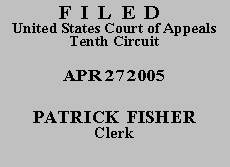

| DANNY DEWAYNE BREWER,
Plaintiff - Appellant, v. MIKE MULLIN, Warden; MELINDA GUILFOYLE, Director's Designee; KAREN KNOX, BRAD MATTIODA, LEROY HARRIS, Correctional Officers, Defendants - Appellees, and FREDDY COOK; JODY DOZIER, Correctional Officers, Defendants.
|
|
Danny Brewer, a prisoner proceeding pro se, appeals the district court's dismissal of his 42 U.S.C. § 1983 action for lack of exhaustion of administrative remedies. We have jurisdiction under 28 U.S.C. § 1291, and we affirm.
Mr. Brewer's complaint includes three claims: (1) that in February 2001, guards removed him from his cell with excessive force and beat him; (2) that he was denied access to the prison's law library; and (3) that prison officials were deliberately indifferent to his safety. The district court found that Mr. Brewer had not timely and completely exhausted his administrative remedies with regard to any of his claims, granted defendants' motion for summary judgment on the issue of exhaustion, and dismissed the complaint as frivolous. We review the district court's decision regarding exhaustion de novo. See Jernigan v. Stuchell, 304 F.3d 1030, 1032 (10th Cir. 2002); see also McBride v. Deer, 240 F.3d 1287, 1289 (10th Cir. 2001) (holding that a § 1915(e)(2)(B) dismissal is reviewed de novo).
The Prison Litigation Reform Act (PLRA) requires timely and complete exhaustion of administrative remedies prior to filing a § 1983 claim concerning prison conditions. 42 U.S.C. § 1997e(a); Booth v. Churner, 532 U.S. 731, 741 (2001); Jernigan, 304 F.3d at 1032. Under the applicable policy, Oklahoma inmates like Mr. Brewer must engage in a three-step process to exhaust their administrative remedies: an informal attempt at resolution at the unit staff level, submission of a grievance to the reviewing authority, and appeal of an adverse determination to the Oklahoma Department of Corrections (ODOC). R. Doc. 19, Attach. F, at 4-10. Our review of the record satisfies us that Mr. Brewer did not properly complete all of these steps for any of his claims.
With regard to Mr. Brewer's excessive force and deliberate indifference claims, the record indicates that Mr. Brewer attempted to bypass the normal grievance procedures by filing "emergency" grievances or by skipping steps in the procedure. Prison officials refused to accept the grievances outside of the normal procedure and directed Mr. Brewer to resubmit his grievance in accordance with policy, but he did not do so. With regard to the denial of access claim, the record indicates that Mr. Brewer failed to pursue the grievance procedure to its conclusion by appealing to ODOC.
Mr. Brewer argues on appeal that he exhausted his remedies by presenting his issues to the warden and ODOC. Simply presenting a defective or non-complying grievance, however, does not constitute exhaustion of remedies. "An inmate who begins the grievance process but does not complete it is barred from pursuing a § 1983 claim under PLRA for failure to exhaust his administrative remedies." Jernigan, 304 F.3d at 1032. "[W]e reject [plaintiff's] assertion that inmates do not have to properly complete the grievance process, and they do not have to correct deficiencies." Id. (quotation and alteration omitted; emphasis in original). Mr. Brewer may believe that prison officials erred in deciding his issues were not emergencies, but that does not mean that he can simply ignore their determination and opt out of the grievance procedure.
Mr. Brewer also argues on appeal that prison officials ignored his grievances or intercepted them so that they were never filed. Having reviewed his arguments and the record, however, we are not persuaded that prison officials or ODOC impermissibly impeded Mr. Brewer from availing himself of the grievance process or otherwise prevented him from exhausting his administrative remedies with regard to these claims.
Mr. Brewer's motion for leave to proceed on appeal without prepayment of costs or fees is GRANTED, and he is reminded that he is obligated to continue making partial payments until the entire appellate filing fee has been paid. The judgment of the district court is AFFIRMED. The mandate shall issue forthwith.
Entered for the Court
Circuit Judge
*. This order and judgment is not binding precedent, except under the doctrines of law of the case, res judicata, and collateral estoppel. The court generally disfavors the citation of orders and judgments; nevertheless, an order and judgment may be cited under the terms and conditions of 10th Cir. R. 36.3.